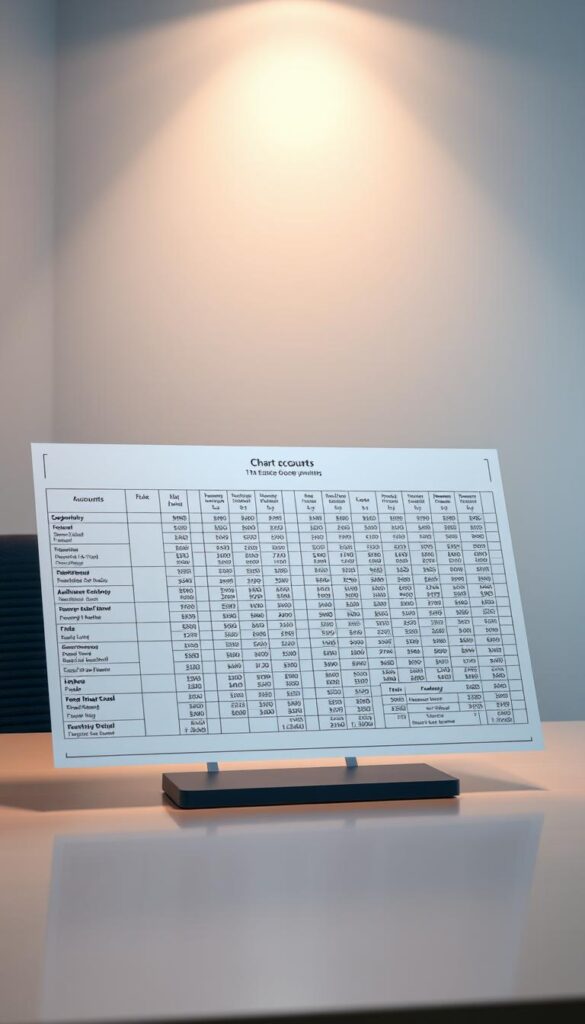Ever wondered why some real estate investors stay financially healthy while others face big mistakes? The secret lies in effective Real Estate Accounting. It’s key for investors and landlords aiming to succeed in property management. This guide will teach you how to manage your money well, making smart choices that boost your finances.
Learning about income, expenses, and tax breaks is important. Mastering these skills will help you stand out in the real estate world.
Key Takeaways
- Real Estate Accounting is essential for managing financial transactions related to property.
- Accurate records are vital for real estate success, big or small.
- Knowing cash and accrual accounting is important for good money management.
- Regular financial checks help you see how you’re doing and plan better.
- It’s important to keep your personal and business money separate to avoid mix-ups.
- Using digital accounting tools can make tracking your finances much easier.
Introduction to Real Estate Accounting
Real estate accounting is key for successful property investment and financial management. As a property investor or landlord, you handle many financial deals. Knowing accounting well helps you record each deal right, follow tax laws, and manage your investments well.
Accurate accounting is vital for knowing your financial health. It helps improve your investment plans.
Many real estate pros make money from selling properties and getting commissions. It’s important to know the difference between income and expenses to stay profitable. Costs like keeping a real estate license, marketing, and fees matter a lot.
Checking your financial accounts often is essential. It helps you keep your business finances in check.
Using accounting software can make things easier. It gives you quick access to your financial records. This saves time and cuts down on mistakes.
Outsourcing your accounting can also boost efficiency. It lets you focus more on your real estate projects. Real estate accounting is the foundation of good financial management. It makes operations smoother and boosts profits.
What is Real Estate Accounting?
Real estate accounting tracks financial transactions in the real estate world. It includes buying properties, managing sales, and leasing agreements. It helps professionals understand their finances, which is key for managing money well.
The Real Estate Accounting Definition shows the difference between bookkeeping and accounting. Bookkeeping deals with daily transactions. Real estate accounting, on the other hand, analyzes and reports financial data. A good accounting system is vital for finance pros in property management to follow rules and report accurately.

In 2024, real estate accounting is more critical than ever. The industry’s financial management is getting more complex. This calls for advanced accounting to create detailed reports. These reports help owners and investors make smart choices.
Real estate accounting goes beyond just tracking. It also looks at property management costs, like fees that are 8% to 12% of monthly rent. It tracks deductions like maintenance and marketing, affecting taxes as shown on IRS Schedule E form 1040.
Cloud-based accounting systems have changed how we access financial records. They let real estate pros check their accounts anytime and get instant insights. This makes accounting easier, leading to better decisions and work flow.
Importance of Real Estate Accounting for Investors
Real estate accounting is key for investors aiming at financial success. It involves tracking and reporting on property deals. This helps in making better decisions, like managing cash flow and budgets.
Keeping your accounts up to date is vital for tax savings. It lets you watch your income and expenses closely. This way, you can grow your real estate investments wisely.
Income statements are important for showing how much money your properties make and spend. They help track different types of income and expenses. This shows how profitable your properties are.
Choosing the right accounting method is important. Accrual accounting, for example, records income when it’s earned and expenses when they’re incurred. This gives a clearer picture of your financial health, which is great for managing many properties.
Investors should use advanced accounting software for better financial insights. Regularly reviewing your accounts helps spot problems early. Working with expert accountants can also help you understand taxes and financial strategies better.
Real Estate Accounting Processes
Understanding Real Estate Accounting Processes is key to keeping your finances in check. Tracking your expenses and income helps you make smart choices. Keeping records organized makes it easier to find important documents and avoid mistakes during tax time.
Using digital accounting software can make things easier. Tools like Stessa help track your money and create reports. This makes managing your finances simpler.
Having a well-organized business checking account is important. It helps avoid tax errors and improves cash flow. Online rent payment services like RentTrack also help by reporting payments to credit bureaus. This can lead to better financial health for property owners.
Creating a detailed chart of accounts is essential. It should cover assets, liabilities, equity, revenue, and expenses. This way, you can easily track your property’s performance using metrics like ROI and NOI.
| Software | Starting Price | Features |
|---|---|---|
| Appfolio | $280/month | Comprehensive accounting and reporting tools |
| FreshBooks | $108/year | Easy invoicing and expense tracking |
| Landlord Studio | $5.99/month | Over 15 customized reports for landlords |
| Quicken Rental Property Manager | $93.59/year | Expense tracking and financial reporting |
| Rentec Direct | $35/month | Property management and accounting services |

Choosing the Right Accounting Method
Choosing the right accounting method is key for good real estate management. You have two main options: cash basis and accrual basis. Knowing these helps you manage money well and make the most of tax benefits.
The cash basis method records money when it’s exchanged. It’s simple and fits well with real-time cash flow. Many landlords and small business owners find it easy to use.
The accrual basis method records transactions when they happen, not when money is exchanged. It gives a full view of your finances but needs careful record-keeping. You must watch your income and expenses closely.
Choosing the right method helps you claim expenses correctly. Keeping accurate records helps avoid overpaying taxes. The IRS asks landlords to keep all receipts and documents for tax reasons.
Over 10 million people in the U.S. own rental properties, and half use property managers for accounting. This shows how important it is to pick a method that fits your financial needs and local tax laws. Using property management accounting software can help automate tasks and keep your method consistent.

Creating a Chart of Accounts
Creating a Chart of Accounts (COA) is key for real estate investors and managers. It helps sort out income and expenses from real estate activities. A good COA makes it easier to track finances and create accurate reports.
Defining Income and Expense Categories
Your COA should clearly list Income and Expense Categories. Income includes things like rent and extra fees. Expenses cover costs like maintenance and management fees. This helps you understand your finances well, which is important for taxes and property performance.
The Importance of Organization
Keeping your COA organized is essential for financial health. It makes it easier to update and check your financial records. A well-organized COA helps manage assets, liabilities, and equity efficiently.
Regularly reviewing and updating your COA keeps it current with your business’s financial changes. A structured COA helps manage cash flow and expenses well.

Tracking Rental Income and Expenses
Keeping track of rental income and expenses is key for real estate success. Accurate tracking shows profit margins and cash flow. Accounting software makes this easier by automating tasks and reports.
![]()
Automating tracking and expense management saves time and cuts down errors. Tools like Landlord Studio offer real-time tracking. You can sort expenses like maintenance, mortgage, and legal fees.
Organizing expenses is vital. Keeping rental finances separate from personal ones meets legal needs and avoids confusion. Regular bank statement checks ensure all transactions are recorded, keeping cash flow healthy.
Using online rent collection systems improves oversight. They send payment reminders, cutting down on late fees. Having a fund for unexpected repairs helps manage finances smoothly.
Property management software boosts tracking and offers financial insights. Annual reviews of income and expenses help plan for the future, ensuring a profitable rental business.
Tax Deductions for Real Estate Investors
Knowing about tax deductions is key to making more money as a real estate investor. By understanding deductible expenses, you can lower your taxable income. This means more profit for you.
Common Deductible Expenses
As a real estate owner, you can claim many expenses. These include:
- Mortgage interest on loans for your rental properties
- Property taxes paid to local authorities
- Operating expenses like utilities and management fees
- Repairs to keep the property in good shape
- Home office expenses, if you work from home
It’s important to keep good records of these expenses. This helps you prove them during audits. It can save you from extra taxes or penalties.
Understanding Depreciation Benefits
Depreciation helps you recover the cost of property improvements over time. This can lead to big tax savings. Unlike repairs, improvements are not directly deductible. Instead, you can recover their cost through depreciation.
Depreciation is a key strategy for keeping your rental investment profitable. The IRS says depreciation for residential rental properties takes 27.5 years. Also, renovations done before the property is used must be depreciated.
By using tax deductions and understanding depreciation, you can make your investment more profitable. Knowing these strategies helps you make better decisions. This can increase your investment’s value.

| Deductible Expense Type | Description |
|---|---|
| Mortgage Interest | Interest on loans for buying rental properties |
| Property Taxes | Taxes from local governments on your properties |
| Operating Expenses | Costs for utilities, management fees, and daily expenses |
| Repairs | Costs for maintenance and repairs to keep the property value up |
| Home Office Deduction | Deductions for home office usage, limited by square footage |
Financial Reporting and Cash Flow Analysis
Effective Financial Reporting and Cash Flow Analysis are key for real estate success. Investors who make detailed financial statements like profit and loss reports get valuable insights. These reports help see which properties make money and where to make changes.
Using modern accounting software like QuickBooks Online helps track money in real-time. You can see your financial health from any device with internet. This helps make better choices about spending and investments.
Real estate investments have different profit margins based on cash flow. For example, if you make $36,000 a year in rent but only $31,500 after expenses, you must watch your spending. After paying a $15,000 mortgage, your profit is $12,500. This shows how important keeping a positive cash flow is.
Keeping an eye on cash flow helps you stay financially strong. Tools like Rentastic make tracking income and expenses easier. This makes your financial records more accurate, saving time on taxes and boosting productivity.
When looking at your Profitability, remember to plan for maintenance costs. Fannie Mae suggests setting aside 4% of rent for maintenance. Experts say 10%–15% is better. This way, unexpected repair costs won’t hurt your cash flow.

Developing a Real Estate Portfolio
Building a strong real estate portfolio needs smart planning and financial knowledge. A key part of your success is Real Estate Portfolio Development. This means spreading your properties across different types and places. This helps reduce risks and increase profits.
When looking at Investment Strategies, think about how each property might grow in value over time. Places with growing jobs and more people are often good investments. Also, steady rental income is key to making more money through smart management.
Using property management software can make things easier. It helps keep tenants happy and lowers turnover. Good management keeps your properties in top shape. This keeps your cash flow steady and boosts your portfolio’s value.
| Expense Type | Estimated Monthly Cost |
|---|---|
| Property Management Fees | $300 |
| Maintenance Costs | $200 |
| Utility Bills | $150 |
| Property Insurance | $100 |
Also, using the equity from your current properties can help fund new investments. Real Estate Investment Trusts (REITs) and real estate mutual funds offer flexibility and diversification. They help grow your portfolio while reducing risks from single investments.
In short, good Real Estate Portfolio Development means careful analysis and management. With smart Investment Strategies, you can have a steady income. Plus, your portfolio can grow over time.

Real Estate Accounting: A Guide for Investors & Landlords
Real estate accounting is key for anyone in property investments. This guide helps you understand the basics of real estate accounting. It’s vital for investors and landlords to know these principles.
Investors learn how to track income and manage expenses. They also learn to keep accurate financial records. This knowledge helps them handle costs like marketing and travel.
Landlords use special accounting tools and software for real estate. Tools like Cozy and Stessa make tracking income and expenses easier. They help landlords use tax benefits and manage cash flow better.
Good accounting practices help you get funding or attract investors. Regular financial checks help find and fix problems early. Keeping separate accounts for each property makes tracking easier.
Knowing real estate accounting well helps investors and landlords succeed. By using these strategies, you can do well in the competitive real estate world.

Conclusion
Mastering Real Estate Accounting is key to success in real estate investing. This guide has shown you the basics, like tracking income and expenses. By using good accounting practices, you can improve your investment decisions.
Good accounting helps all real estate businesses, big or small. Using automated software can make your finances easier to manage. It helps you see how much money each property makes and how to handle changes in money.
In short, good Real Estate Accounting is vital for your business to thrive. Keep up with your finances, make smart choices based on data, and follow the rules. With careful money management, you’re on the path to success in real estate.
FAQ
What are the key components of real estate accounting?
Why is real estate accounting important for landlords?
How do I choose between cash and accrual accounting methods?
What is a chart of accounts, and why is it important?
What tax deductions can real estate investors claim?
How can I effectively track rental income and expenses?
What role does financial reporting play in real estate accounting?
How does real estate accounting support portfolio development?
Source Links
- Real Estate Accounting: A Complete Guide for Investors and Landlords (2024) 🏡💼 | Jordensky – https://www.jordensky.com/blog/real-estate-accounting-a-complete-guide-for-investors-and-landlords-2024
- Real Estate Accounting: The Definitive Guide For 2025 – Landlord Studio – https://www.landlordstudio.com/blog/real-estate-accounting-the-definitive-guide-for-2023
- Real Estate Accounting: A Complete Guide for 2025 – https://www.freshbooks.com/hub/accounting/accounting-for-real-estate-businesses?srsltid=AfmBOoozn8snV3Ms_tzm48ub4Tk3xZ_VJG6WM7YXGSeQvhW4ByyFJop_
- Real Estate Accounting Guide: Principles, Software, & More – https://www.unitedcapitalsource.com/blog/real-estate-accounting/
- The Guide to Real Estate Accounting in 2024|Greg O’Brien, CPA, CTS – https://www.anomalycpa.com/post/the-guide-to-real-estate-accounting-in-2024
- Real Estate Accounting: A Complete Guide for 2025 – https://www.freshbooks.com/hub/accounting/accounting-for-real-estate-businesses?srsltid=AfmBOorJcoL2EZS0YyKuQbw3Iiv0XmjHvMmgH5RsynyVkRCJpjDGuj_s
- Real Estate Accounting Fundamentals – https://www.excelsiorgp.com/resources/real-estate-accounting-fundamentals/
- The Complete Guide to Real Estate Accounting – https://dimovtax.com/real-estate-accounting-guide/
- Real Estate Accounting: A Complete Guide for 2025 – https://www.freshbooks.com/hub/accounting/accounting-for-real-estate-businesses?srsltid=AfmBOooFpVzVJhpFCDYYUxwlc_kI6m81j9th0kSMt7RfwLfgmk7q7ccf
- Real Estate Accounting for Rental Properties: A Comprehensive Guide – https://accountinginsights.org/real-estate-accounting-for-rental-properties-a-comprehensive-guide/
- Real estate accounting: A clear and simple guide for 2025 – https://learn.roofstock.com/blog/real-estate-accounting
- Real Estate Accounting 101 — The Basics – https://expertiseaccelerated.com/real-estate-accounting-basics/
- The Investors Guide To Property Management Accounting – Landlord Studio – https://www.landlordstudio.com/blog/property-management-accounting
- Real Estate Accounting: A Beginner’s Guide – https://www.doorloop.com/blog/real-estate-accounting
- Rental property chart of accounts (free template & resources) – https://www.stessa.com/blog/rental-property-chart-of-accounts-template/
- Ultimate Guide To Creating A Rental Property Chart Of Accounts For Property Management | Taxfyle – https://www.taxfyle.com/blog/chart-of-accounts-for-rental-property
- Creating an Effective Chart of Accounts for Your Real Estate Business – https://www.rentastic.io/blog/real-estate-chart-of-accounts
- The Complete Guide: How To Categorize Rental Property Expenses – Landlord Studio – https://www.landlordstudio.com/blog/how-to-categorize-expenses
- Landlord’s Guide to Rental Property Accounting – https://www.allpropertymanagement.com/blog/post/landlord-rental-property-accounting/
- Tips on rental real estate income, deductions and recordkeeping – https://www.irs.gov/businesses/small-businesses-self-employed/tips-on-rental-real-estate-income-deductions-and-recordkeeping
- Rental Property Tax Deductions: The Definitive Guide – Stessa – https://www.stessa.com/blog/rental-property-tax-guide/
- Managing Cash Flow for Real Estate Investors: Tips for Long-Term Success – https://www.rentastic.io/blog/cash-flow-for-real-estate-investors
- Free Rental Property Cash Flow Analysis – https://www.doorloop.com/blog/free-rental-property-cash-flow-analysis
- Managing Cash Flow for Your Rental Business | Landlord Studio – https://www.landlordstudio.com/university/managing-cash-flow-for-your-rentals
- Real Estate Accounting: A Complete Guide for Investors – https://www.rentastic.io/blog/real-estate-accounting
- How to Build a Real Estate Portfolio – https://www.allpropertymanagement.com/resources/property-investment/how-to-build-a-real-estate-portfolio-beginners-guide-to-rental-investments/
- The Essential Guide to Real Estate Portfolio Management – https://www.revolutionrentalmanagement.com/property-management-blog/the-essential-guide-to-real-estate-portfolio-management
- Real Estate Accounting: A Complete Guide for 2025 – https://www.freshbooks.com/hub/accounting/accounting-for-real-estate-businesses?srsltid=AfmBOoqu2DLgLAPRbI2lZQa3E-8SJd-HGxzHxgi9umct7goUoFoUYWNt
- Rental Property Accounting & Bookkeeping 101: Landlord’s Guide – https://www.stessa.com/blog/rental-property-accounting-101/
- Real Estate Accounting: Your Comprehensive Guide for 2025 – https://www.reihub.net/resources/real-estate-accounting/
- Real Estate Accounting: A Complete Guide for 2025 – https://www.freshbooks.com/hub/accounting/accounting-for-real-estate-businesses?srsltid=AfmBOorDoZAyGm-rfDrlVrF8BNGtpj-AZBhoe3BAcPgNK-w6G63n4DHJ
- Accounting for Real Estate: A Beginner’s Guide – https://www.nsktglobal.com/usa/blog/real-estate-accounting-beginners-guide